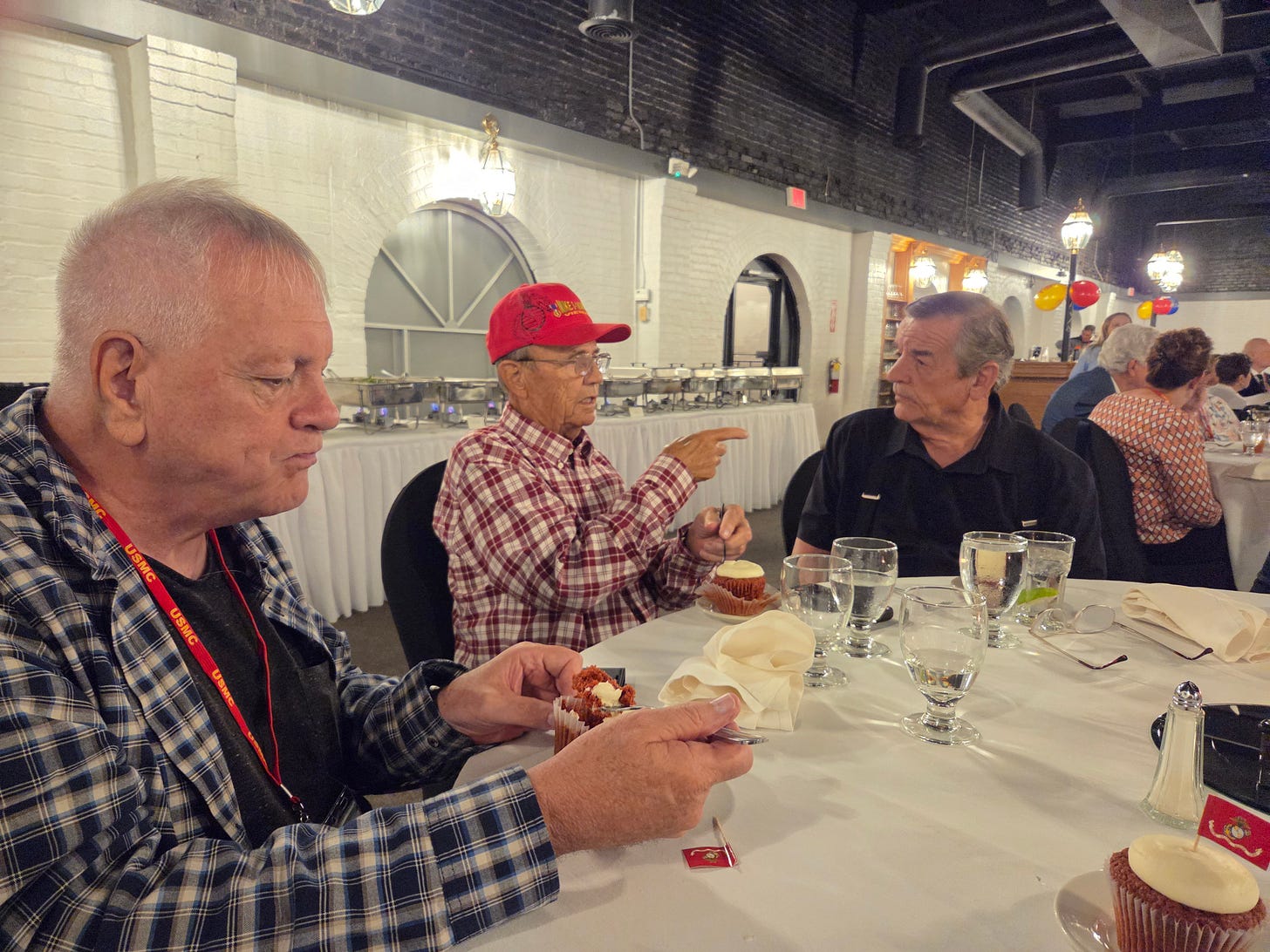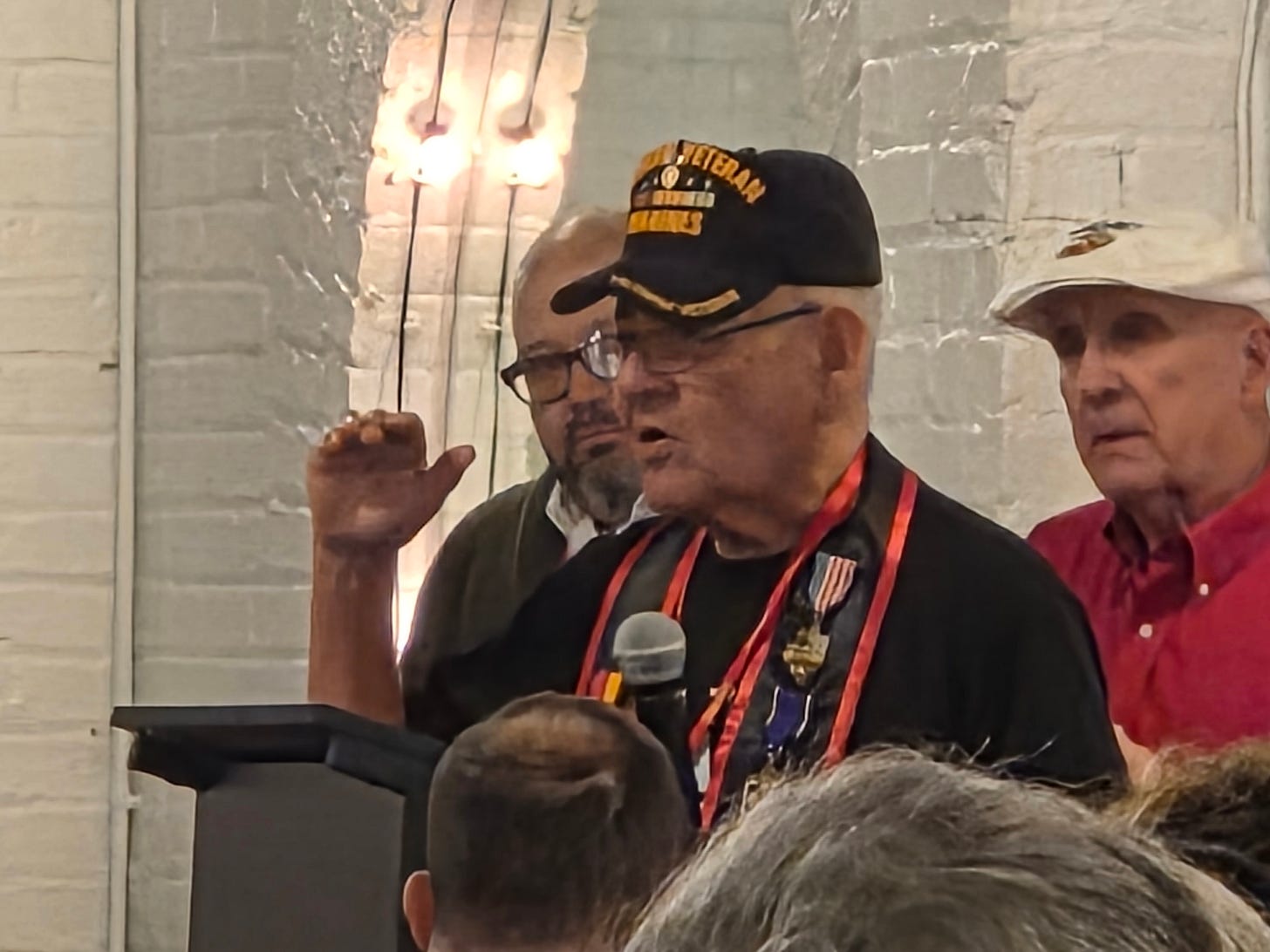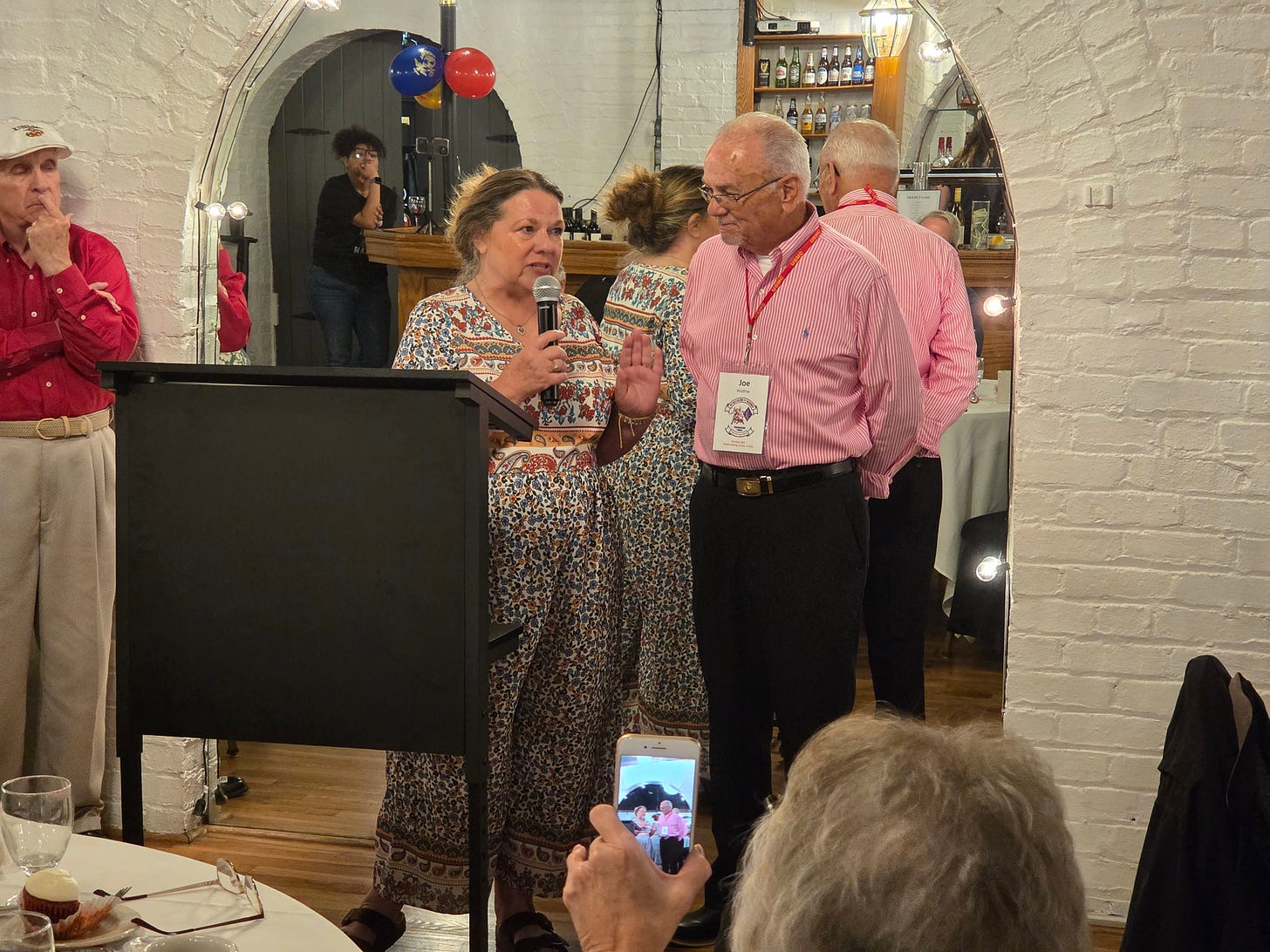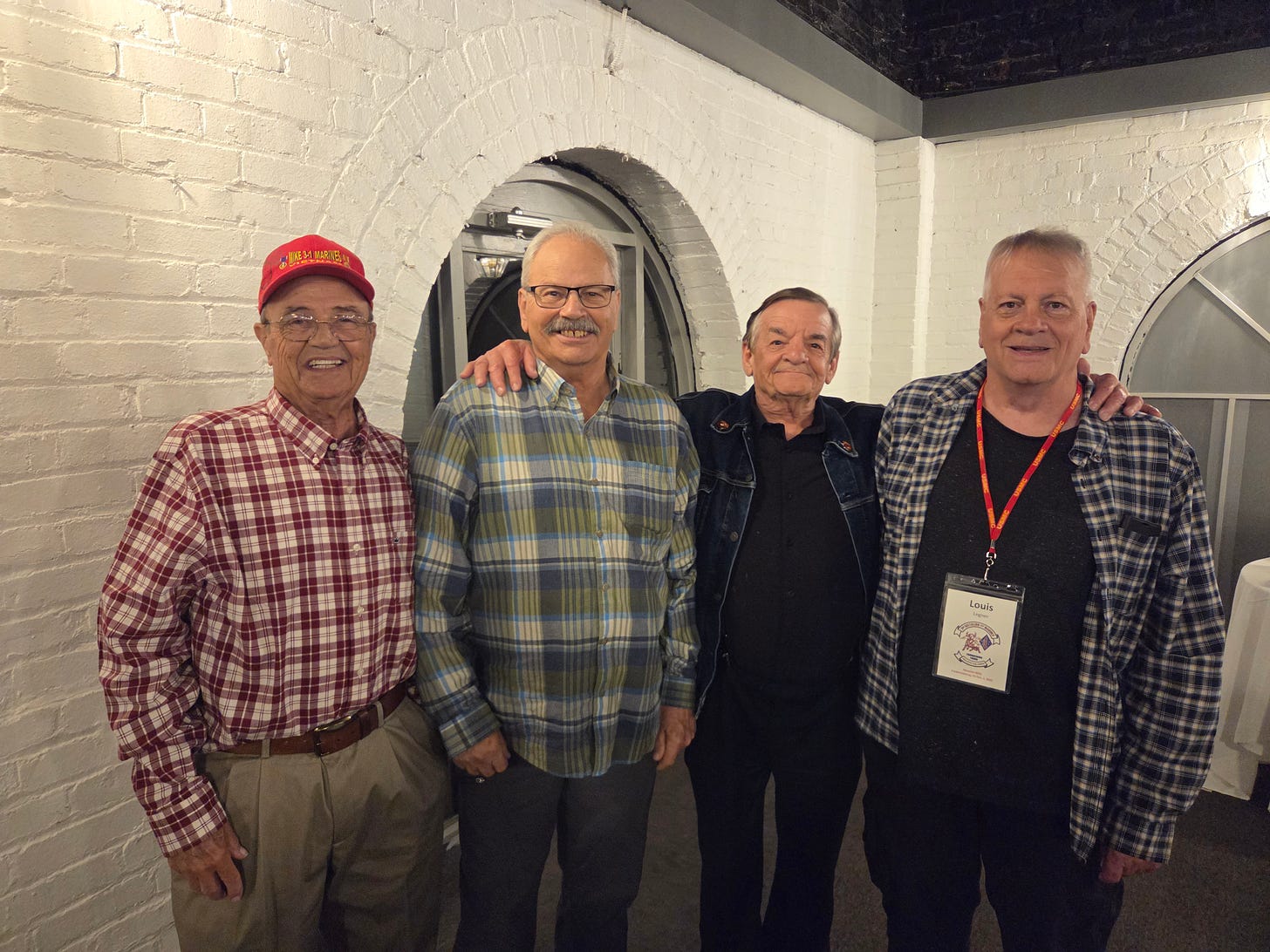"Thank You for Coming Home"
For the men of the Mike 3-1 Marines, the months in Vietnam stay with them, but they're finally telling their stories for others, and for themselves.
By Martin Davis
EDITOR-IN-CHIEF
Email Martin

Ask someone where they were on September 11, 2001, and the memories and details will likely flow — even a quarter-century later. But the day before? Most people would be hard-pressed to recall any details.
For the Marines of Mike 3-1 — Mike Company, Third Battalion, First Marines — every moment of every day of their time in Vietnam from late 1966 to 1970 is seared in their memories.
Louis Legner was one of roughly 40 members of Mike 3-1 who traveled to Fredericksburg last week for a reunion. And like all the men there, he hugged friends he had not seen in decades, swapped stories, and reflected openly on some of the darkest days in Vietnam.
“I was there when he was shot,” Legner said of his friend John Potts who was seated to Legner’s left during dinner.
He recalled the incident as if it were yesterday. “I saw the whole thing,” he told the Advance. Potts was struck in his abdomen. His flak jacket — and a buddy named Barnaby who immediately jumped on top of Potts for protection — were what saved him.
On Friday, the two men laughed, remembering that they had to practically plead with Barnaby to get off.
They two men remembered other details of their time in Vietnam with absolute clarity, too. The day they were dropped in. The weather. The day they went home. And seemingly every moment of every day in between.

Not all stories ended well and brought smiles, however.
He and Potts were fighting near the Cua Viet River about 10 miles south of the demilitarized zone at the time of the Tet Offensive — the major surprise offensive push launched on January 31, 1968, by the North Vietnamese People’s Army of Vietnam and the Viet Cong — and were involved in some of the bloodiest fighting of the Vietnam War.
“We meet [at this reunion] to remember and honor those killed,” Potts said.
At a memorial earlier in the week, the 187 names of 3-1 Marines who didn’t make it home were read — “there wasn’t a dry eye in the place,” Potts said, his congenial smile giving way to straight lips and eyes that were going back in time to another place that never leaves him.
What these veterans experienced, said Major Nathaniel Sims from the History Division of the USMC who is doing an oral history of Mike 3-1, “was horrific. They experienced the entire range of human emotions in the months [that they served] — blood and death, but also love.” And they did it in an extremely compressed way.
For people who have engaged in that type of intense combat, “that level of recall is typical,” he said.

Many of the Marines taking part in the reunion took part in Operation Badger Tooth, which launched in December 1967 and was a search-and-destroy mission in the Quảng Trị Province. The combat, Sims noted, was hand-to-hand and particularly vicious.
As if the combat wasn’t enough, for the new people coming in, they had to face it mostly alone.
“Those first weeks were particularly tough on the new guys,” Potts told the Advance, “because [the guys who had been in-country for a while] didn’t want to get too close to the new guys.”
The reason?
Every time a friend died, Potts said, “it took a part of you with them.”
‘Thank You for Coming Home’
One of the people who did get close to the new arrivals was Bob Kinzel. Now living in California, Kinzel is the man Legner credits with helping him adjust.
The adjustments were trying — both the short-term adjustments one had to make to survive combat, and the long-term adjustments people had to make when they returned home.
For Legner, the short term adjustment was all about confidence. Those early days, he said, “you didn’t know if you’d survive. But as the weeks passed, you grew more confident. And by the 11th month, you’re thinking, I’m going to get out of this alive.”
Throughout the evening, the floor was opened for the vets to talk and to share their experiences of the war and their experiences upon returning home. One of those who came forward was Joe Wadlow, who faced a particularly difficult first few days in-country.

During his first operation, he was dropped in and immediately tended to a soldier who had been shot. When he turned him over, he discovered the exit wound and realized it was a dire situation.
He stayed with the soldier until he could be helicoptered out. The soldier didn’t make it.
To one of the family members attending the reunion, the soldier that Waldow tended to was “Uncle Mark.”
“My family never talked about Uncle Mark,” she told the crowd. She knew only that he died in Vietnam.
Decades later, she connected with Wadlow, who relayed to her Uncle Mark’s final moments.
Those moments are private, between the two of them. But she did have a message for the vets in the room.
“Thank you for coming home.” In coming home, she said, you carried your own stories, and the stories of those who didn’t make it back, to the people who weren’t there. “So that we don’t forget,” and we can inform those who never experienced war the way you did.
But coming home meant a new adjustment for the men of Mike 3-1.
Pott’s wife, Carolyn, told the Advance that for the first decade upon his return, her husband turned inward and struggled to deal with the memories of what he had seen and been involved with.
“People are not meant to see and do the kinds of things” these men saw and were engaged in during Vietnam, said Major Sims.
It was a consistent theme throughout the evening, as vet after vet came to the mic and told stories of the horrible moments that bonded them to one another.

One vet summed it up succinctly: “I thank you,” he told those in the upstairs room at Brock’s, “for being my right and my left, my front and my back.”
Ron Buckhammer has been a driving force in bringing together Mike 3-1 Marines for reunions that this year took place here in Fredericksburg.
“They gave it their all every day under fire,” he said. They are true “patriots.”
For too long, the only people who knew those memories were the men themselves, and those family members they were closest to.
Today, Buckhammer and others are making sure that because these men are willing and finally able to tell their stories, they won’t be lost.
Some things should never be forgotten.
Local Obituaries
To view local obituaries or to send a note to family and loved ones, please visit the link that follows.
Support Award-winning, Locally Focused Journalism
The FXBG Advance cuts through the talking points to deliver both incisive and informative news about the issues, people, and organizations that daily affect your life. And we do it in a multi-partisan format that has no equal in this region. Over the past year, our reporting was:
First to break the story of Stafford Board of Supervisors dismissing a citizen library board member for “misconduct,” without informing the citizen or explaining what the person allegedly did wrong.
First to explain falling water levels in the Rappahannock Canal.
First to detail controversial traffic numbers submitted by Stafford staff on the Buc-ee’s project
Our media group also offers the most-extensive election coverage in the region and regular columnists like:
And our newsroom is led by the most-experienced and most-awarded journalists in the region — Adele Uphaus (Managing Editor and multiple VPA award-winner) and Martin Davis (Editor-in-Chief, 2022 Opinion Writer of the Year in Virginia and more than 25 years reporting from around the country and the world).
For just $8 a month, you can help support top-flight journalism that puts people over policies.
Your contributions 100% support our journalists.
Help us as we continue to grow!
This article is published under Creative Commons license CC BY-NC-ND. It can be distributed for noncommercial purposes and must include the following: “Published with permission by FXBG Advance.”












